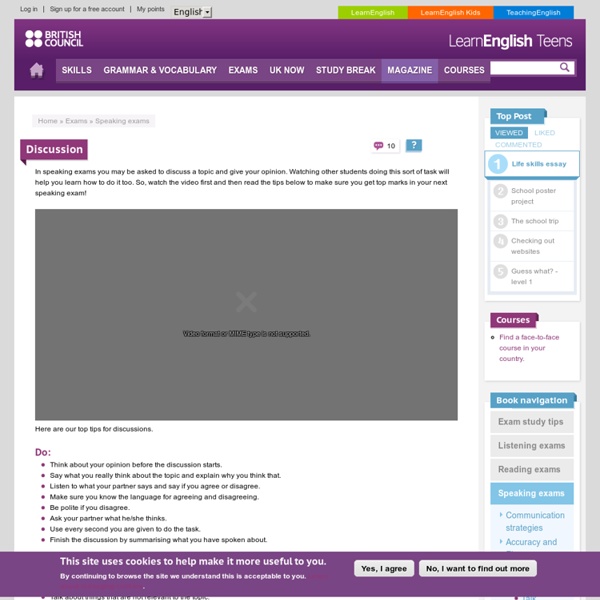Discussion
Social networking can be too dangerous for young people and should only be available to adults. Examiner: So, now we’re going to have a short discussion. You’ve got one minute to take notes and prepare together for a two-minute discussion. Remember to listen, take turns and explain your opinions. Kelvin: So, shall I start first? Melissa: Sure. Kelvin: Yeah, so we need to discuss whether social networking can be dangerous for young people and whether they should be only available to adults. Melissa: I disagree with that statement because I think young people can keep contact with old or new friends on their social network and it can develop their good relationships and it can increase their self-esteem. Melissa: I see your point, but I think it can give the teenagers a chance to notice who is good and who is bad and to try to learn how to protect themselves from these guys. Kelvin: That’s true, yes. Kelvin: Yes.
Information gap activity
Examiner: So, you’re planning a trip to the cinema together. You’ve got some information about films but your information’s not complete. Ask your partner to find out the missing information. Then, discuss together which films you’d like to see and choose a film to go and see together. Kelvin: So, the first film is Karemon but I don’t know the show times for it. Melissa: Let me see, it’s at one o’clock in the afternoon and 6:30. Kelvin: So, what is the ticket price for adults? Melissa: It’s 80 dollars. Kelvin: And the next one is Mr and Mrs Jones. Melissa: They are both international spies. Kelvin: International spies, wow! Melissa: It’s a comedy. Kelvin: Comedy. Melissa: The robot has taken over the world. Kelvin: Taken over the world, wow. Melissa: The ticket price is 75 dollars. Kelvin: 75 dollars. Melissa: It’s my turn. Kelvin: It’s a romance film. Melissa: I see. Kelvin: As you know, his country’s under attack so he has to fight and save his country. Melissa: He’s very brave. Melissa: Yeah.
Talk about yourself
Examiner: Hi. What’s your name? Kelvin: My name is Kelvin. Examiner: Kelvin, OK. Kelvin: I think I like economics most because I can study different kinds of demand and supply theory and I can use it in my daily life to observe the market. Examiner: OK. Kelvin: Actually, I don’t like physics too much because I need to calculate many difficult questions and all those mathematics words. Examiner: I see. Kelvin: Yeah, sure. Examiner: OK, and what would you like to study there? Kelvin: I think I would like to study something about business. Examiner: OK, that’s great. Melissa: My name is Melissa. Examiner: Melissa? Melissa: Yeah. Examiner: Hi, Melissa. Melissa: I’ve got no sisters and brothers. Examiner: And your dog? Melissa: Yeah! Examiner: Great. Melissa: I like mathematics the most because I think it’s satisfying to calculate the solution. Examiner: OK. Melissa: And English, I think, because it’s fun to learn a language. Examiner: Great, OK. Examiner: Sure, OK. Examiner: OK, that’s great.
WHAT’S GOING ON IN THIS PICTURE - The Learning Network Blog
Photo Students 1. After looking closely at the image above (or at the full-size image), think about these three questions: What is going on in this picture? Read more… Updated: Oct. 2, 2015 1. Read more… Updated: Sept. 25, 2015 1. Read more… Updated: Sept. 18, 2015 Welcome back, students and teachers. We’re excited to begin our fourth year of “What’s Going On in This Picture?” We hope students will continue to join our moderators at Visual Thinking Strategies in responding to other students, making the feature truly an interschool conversation. Please note that we’re delaying the reveal until Friday mornings this year to allow students additional time to comment on the image and to reply to other students. Thank you for participating. Read more… Updated: June 2, 2015 Note: This is our final “What’s Going On in This Picture?” 1. What’s going on in this picture? Read more… Updated: May 19, 2015 Note: We’ve switched to the more advanced commenting system used by the rest of The New York Times. That’s all.
Related:
Related:



